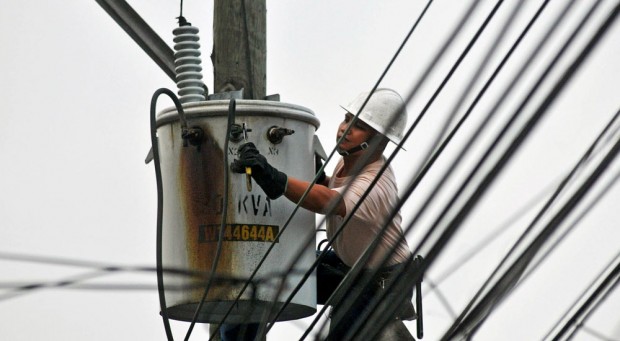Luzon brownouts loom anew; energy execs grilled

INQUIRER FILE PHOTO
MANILA, Philippines — More brownouts are expected to hit Luzon until early August as big power plants remain closed and demand for electricity picks up with the gradual reopening of the economy.
Mario Marasigan, director of the Department of Energy (DOE) Electric Power Industry Management Bureau, told a Senate energy committee hearing on Thursday that based on their latest Luzon power outlook, capacity reserves or available supply would be critically thin in the fourth week of June, third week of July and first week of August, thus red alerts for the Luzon grid were expected during these periods.
He said that this scenario assumed the continued shutdown of the 345-megawatt Unit 1 generator of the GNPower Mariveles coal-fired power plant in Bataan and the 300-MW Unit 2 of the Sem-Calaca coal-fed complex in Batangas. The Calaca facility has been on forced shutdown since December 2020 due to a technical problem while the Mariveles plant conked out last February due to a boiler leak.
Both power plants contributed at least 475 MW to Luzon’s supply, without which peak demand might exceed available capacity in Luzon. When this happens, the privately owned transmission network operator National Grid Corp. of the Philippines (NGCP) would have to resort to rotating brownouts.
Marasigan added that 600 MW or half of the generating capacity of the natural gas-fired Ilijan complex in Batangas and the 382-MW Unit 2 of the Pagbilao coal-fired power complex in Quezon province would be out of service.
The 600-MW Unit 1 of GNPower’s Dinginin coal-fired power complex also in Bataan would also be unavailable, he added.
Officials led by Energy Secretary Alfonso Cusi said during the hearing that a supply shortage might be avoided if Dinginin would deliver to the grid, but the generator was still in its commissioning stage, which is a trial run prior to commercial operations.
Emergency measures
This prompted senators to urge all stakeholders in the country’s energy sector, led by the DOE and private power companies, to activate emergency measures to avert the impending power outages.
They also expressed dismay at how the DOE, the Energy Regulatory Commission (ERC), National Transmission Corp., and NGCP pointed fingers on whose responsibility the country’s dismal power situation rested.
“What we want to understand is what are the measures that the DOE and other agencies are planning to implement to mitigate the brownouts,” said committee chair Sen. Sherwin Gatchalian.
The Senate is investigating the cause of the power outages that hit the country in recent weeks, prompted by Resolution No. 740, and a privilege speech by Sen. Manny Pacquiao.
Senators urged the DOE to form a technical working group and sit down with the ERC, NGCP and the generation companies to plan out measures to avoid the brownouts, and study the pros and cons of NGCP engaging in more contracts for “ancillary services” or power reserves.
Cusi again blamed NGCP’s refusal to secure firm contracts for electricity reserves for the looming brownouts, claiming that there should be no brownouts since there was no supply shortage. With firm contracts, power suppliers are committed to deliver whenever NGCP needed additional supply. With nonfirm contracts, suppliers are not obligated to deliver electricity to NGCP and can choose to sell at the spot market.
Last Wednesday, NGCP president Anthony Almeda said they would start a competitive bidding process for firm contracts for such reserve capacity, but insisted that it was not a solution to the recurring brownouts in the country.
He earlier warned of an astronomical increase in electricity prices if the DOE policy on firm contracts were followed, explaining that such contracts would not result in additional supply, but lead to only a change in payment terms where all electricity, used or unused, would have to be shouldered by the public.
Disappointed
ERC Chair Agnes Devanadera said that based on their simulations related to such firm contracts, it was probable that consumers might have to pay more if the DOE policy were followed.
At one point in the hearing, Senate Minority Leader Franklin Drilon expressed disgust over the various positions of industry players, leading to more confusion for the public.
“Can we not come up with a very brief or concise assurance, or warnings for the public on the situation? We are being fed here with a lot of energy gobbledygook,” he said.
Sen. Risa Hontiveros also lamented how the DOE admitted its helplessness to address the power situation in the country and was baffled to see official records on how NGCP spent P369 million for “representation and entertainment” in 2018 and 2019, and another P79 million for advertisements.
“What do these items have to do with [power] transmission? Are these expenses a critical part of their business?” she asked, adding that these expenditures should not be borne by consumers.
Cusi also insisted on giving his department the power to sanction industry players such as NGCP whenever they disobeyed government policies. Such regulatory authority was transferred to ERC following the Electric Power Industry Reform Act of 2001.
Much of the available electricity supply in the Visayas and Mindanao grids also could not be shared with Luzon because of NGCP’s unfinished transmission lines, Cusi said.
The energy chief called on Congress to revisit the franchise granted to NGCP with a view to giving the DOE the authority to sanction the grid operator for noncompliance with government issuances. INQ














